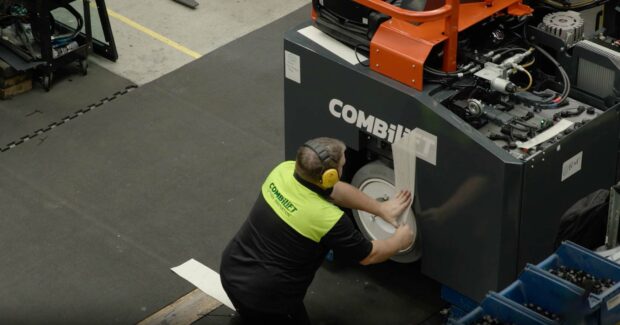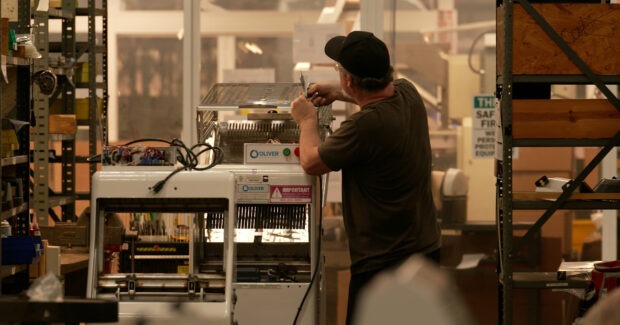Infor’s Software Provides Visibility Across the Full Manufacturing Pipeline
Manufacturers implement Infor’s AI- and ML-enabled cloud software suites to stay on top of customers’ shifting demand patterns, create supply chain resiliency, and improve both client and employee experiences.
Posted: January 4, 2024

Infor’s Mark Humphlett has seen ERP software innovations make leaps and bounds during the past 25 years while working with manufacturers to solve their challenges. He said today’s Artificial Intelligence (AI) and Machine Learning (ML) capabilities allow manufacturers to not only rapidly implement technology to solve their problems, but they also have the ability to do “pretty cool things with these digital technologies,” Humphlett noted. Access to data and data models allow manufacturers to automate non-value-added processes and bring new insights for better, faster decision-making.
Infor provides software solutions and services that help manufacturers increase productivity, customer service and profitability. The company offers manufacturers a diverse set of solutions across a range of business processes: production, supply chain, product engineering and customer experience. Humphlett said smart products, automation and robotics continue to be adopted by metalworking companies, which results in a competitive advantage. “You have to have a digital foundation in place to really grow and differentiate yourself in the market,” he added.
As the senior director of industry and product marketing for Infor, Humphlett’s team develops industry specific cloud software that provides enterprise applications to assist companies. “We lead with our industry CloudSuites that are tailored to meet the specific needs of different micro-verticals and size of business,” Humphlett noted.

The industrial manufacturing industry is among Infor’s key industry targets and metal fabrication is the second largest micro-vertical market, following machinery and equipment companies. Infor’s customers range from small companies of less than $30 million to large enterprise companies of up to $5 billion.
The majority of metalworking companies using Infor’s products in their manufacturing processes benefit from the company’s flagship solution, CloudSuite Industrial. “We have solutions that can help you from one end of your business to the other to help automate and assist with operational efficiencies,” Humphlett said.
He pointed out that Infor appreciates manufacturers need to truly understand just how the buzz words they keep hearing about — Smart Factories and the Industrial Internet of Things, automation and digitalization — will drive efficiencies within their companies.
Metalworking companies want to be assured investments in technology will not only improve efficiency across their production processes, but also provide flexibility within those processes.

Challenges to investing in digital adoption include cost (particularly for small to mid-sized businesses); and for larger enterprises, a barrier is the lack of skills and talent (data scientists) required to work through and make the most of the various automation and augmented intelligence generated through the digital tools.
Recognizing these challenges, Infor is focusing on making sure the manufacturing digitalization process is easier to achieve and embrace. In October, Infor introduced the Enterprise Automation Solution, a set of Infor OS Cloud Services, to help manufacturers rapidly scale automation in order to achieve results faster.
With this new solution users can connect data integration, AI, ML and robotic process automation (RPA), into a single platform within Infor OS. The new capability connects people through the back-end automation, decision automation, and with the release of Infor RPA, a low-code, front-end automation solution. Humphlett said the release differentiates Infor in the marketplace because it focuses on all three areas to provide a complete automation service for a monthly fee, which is attractive to businesses who don’t have data scientists on staff.

An example of the benefit of the new product has to do with automating non- value-added tasks to free up labor to focus on higher value activities. For example, RPA could be used to process engineering changes across hundreds of bills of material or machine learning could complete 80% of the input fields when adding new parts. These tasks are important to do, but time consuming, repetitive and low value.
Equally, the AI and ML allow users to streamline decision-making to recommend the best actions or predict potential issues in order to adjust systems and processes accordingly – this improves the quality and speed of decision-making.
“This is some of the work around AI and ML models that we have been doing for some time,” Humphlett said. “And all of this started for us with our Platform-as-a-Service to be able to offer that back-end automation through integration of all of your different services and different workflows, connecting any combination of either on premise or cloud applications.”
Infor has also developed an ever-growing library of prebuilt automation use cases to help customers scale automation rapidly across functions such as accounts payable, accounts receivable, delivery processing, compliance and more. With the now complete automation suite in a single platform, Infor OS, individual organizations or multiple organizations benefit from the key aspects of digital automation.
 “With RPA and other low-code capabilities, enterprise users can take over and own their automation destiny, and easy-to-use solutions such as Infor Enterprise Automation help them with that,” said Holger Mueller, vice president and principal analyst at Constellation Research, a leading market research and advisory firm. “It is a triple win, as business users get the automation they want and need, a win for IT that can focus precious resources on more critical tasks, and a win for the whole enterprise that can increase its levels of automation, thus achieving what really matters: innovation acceleration.”
“With RPA and other low-code capabilities, enterprise users can take over and own their automation destiny, and easy-to-use solutions such as Infor Enterprise Automation help them with that,” said Holger Mueller, vice president and principal analyst at Constellation Research, a leading market research and advisory firm. “It is a triple win, as business users get the automation they want and need, a win for IT that can focus precious resources on more critical tasks, and a win for the whole enterprise that can increase its levels of automation, thus achieving what really matters: innovation acceleration.”
Reduce Workloads to Better Service Customers
One customer benefitting from Infor’s front-end automation and decision-making automation is Oliver Packaging & Equipment, a manufacturer of food equipment packaging systems. Oliver Packaging & Equipment’s customer contract process was manual and error prone. “It was time consuming having to identify when each and every contract expires — and for the amount of money that is in those contracts,” Humphlett noted.
By automating the contract checking process, tasks and alerts are created when a contract is up for renewal or needs to be renegotiated. Through this, Oliver Packaging & Equipment is able to reduce its contract management workload by nearly 95%.
In another key area of automation, Oliver Packaging & Equipment is detecting customer order anomalies. “They were able to bring in years of history into the application and use this augmented intelligence to become 20-to-30% faster in detecting anomalies to better optimize inventory and review the shifting demand patterns,” Humphlett said. “They are able to take these new customer orders and see if these are leaning toward new purchasing patterns that you can then share with sales and operations in the planning process and take corrective actions as an organization. It frees up time for people to work on more strategic processes to grow their business.”
For another customer, Combilift, Infor’s Coleman AI, a platform technology service integrated with Infor’s CloudSuite Industrial, has allowed the company to improve both client and employee experiences. Combilift, based in Ireland, manufactures multidirectional forklifts. With more than 75,000 unique trucks in operation throughout the world, Combilift’s clients present with specific needs, and are comprised of a range of industries. As such, Combilift needs to ensure its customer service function accurately quotes the right set of parts to ensure a first-time fix when providing after-market service for the customer.
Humphlett said that years of the company’s customer service history combined with Infor’s augmented intelligence and ML have dramatically increased Combilift’s first-time fixes, meaning technicians don’t need to make a second service trip to solve issues. This results in increased uptime for Combilift’s customers, which in turn allows them to provide better services to their customers.
The other piece of the Coleman AI platform, which contains historical data on customer service events, focuses on training new staff members. With the AI platform, customer service reps develop the skills needed to solve a customer’s issue immediately, as opposed to having to conduct research on an issue and calling a customer back with the solution. Through the platform and Product Recommender solution, the correct information is pushed to the customer service rep while they are on the call with the customer, which allows them to automatically recommend parts and services or whatever is required to solve the customer’s issue.
Better Manage Copious Amounts of Data
With so much digital information generated about a metalworking company’s front-end, decision-making and back-end processes, what are the biggest changes seen within an organization? “We have been doing research and talking to a lot of companies and we have seen many companies getting positive returns on their investments in digital technologies,” Humphlett said. “Most have seen advantages around production flexibility and labor efficiency. It is a better use of their resources. That is the strong recognition — to be able to incorporate these technologies.”
Still on the fence or not sure where to start with digitalization and automation of your processes? Humphlett offers a few questions metalworkers should ask themselves regarding what digitizing their processes will mean to them.
- What are the concepts or problems you want to solve? “To survive and compete in a global economy, companies have to move from thinking about doing something and really start doing something,” Humphlett added. But you need to start with a problem in mind to solve versus creating a digital project because “we need to implement AI.” Too many digital projects start out the wrong way.
- How does a company get started? “Start small and scale later,” Humphlett said. “Smaller projects give quick wins in shorter time and allow you to learn how to use the new technologies. You need to pick your project and start working on it. Again, start doing instead of thinking. We like to scope a digital project to complete in under 90 days, that way you can see the results quickly.”
Humphlett also noted the importance of cybersecurity functions and applications to support manufacturers as they undertake their digital journeys. “I am sure that you have seen that half of your manufacturing companies have been a victim of some form of cybercrime over the last few years,” Humphlett said. He noted that 10 years ago companies were looking at security concerns as an inhibitor to cloud adoption. Today, manufacturers are looking at the cloud as a way to provide security.
Infor utilizes Amazon Web Services (AWS) to provide security for cloud applications and investments. “All of our solutions run on AWS, and it gives us consistent reliability, the performance and scalability we need, and disaster recovery, which is included in your subscription of the cloud service that we offer,” Humphlett said.
As we head into 2024, Humphlett encourages metalworkers to continue to explore or continue implementing automated processes, not letting costs and lack of skills hold you back. “We have very simple and flexible pricing models that are based on the execution hours, which really allows for unlimited bots and developers to help democratize, if you will, that creation of automated flows,” he said. “It really empowers the business users in an IT department to adopt the different solutions and technologies.”
Humphlett added that Infor provides users with a differentiated solution. “We offer a complete automation solution with a library of prebuilt use cases to help customers figure out how to automate across those different processes. We are well positioned to help manufacturers with their digitalization projects.”
Combilift Leverages AI to Scale and Meet Service Demands
For Combilift, the world’s largest manufacturer of multidirectional forklifts, positive customer service calls, for both the customer and the customer rep, are vital to success. Because the company manufactures unique trucks for a variety of industry sectors, the parts department must quote the right set of parts for a service job for the first time.
Combilift utilizes Infor’s Coleman AI, a platform technology service integrated with Infor’s CloudSuite Industrial software, to instantly generate accurate parts recommendations when quoting parts. Combilift uses Infor’s CloudSuite in all aspects of its business, from order entry and parts picking for production to the finished truck being dispatched to the customer.
Regarding the parts department, “Our global parts department relied on a knowledge-based, manual process in determining the sum of parts needed to service a truck,” said Kenny Gilmour, global parts manager at Combilift. “This approach is not always accurate and consistent, especially with less-experienced staff. With the global staff shortages, trying to recruit staff who are already trained is, obviously, exceedingly difficult. But with Infor Coleman AI, we can train the machine, and, in turn, it can train us.”
When the right set of parts is not quoted for a service job, a service engineer sometimes cannot complete the job the first time around. Instead, the engineer must stop work, research and secure the right parts, and then return to the customer to complete the service. The delay in completion increases the cost of the service to the dealer and the customer because the machine being serviced remains nonoperational.
By taking three years of historical data to train Coleman AI, more accurate parts recommendations are generated instantaneously when quoting parts. In less than 60 days, Coleman AI parts recommendations were delivered directly in the Parts Estimator screen of CloudSuite Industrial. This is where the parts department spends most of its day, so having these recommendations available directly in the business application generates faster, more accurate quotes.
Among other advantages, Combilift realized:
- 30% increase in first-time fixes
- 30% faster completion of service jobs
- 30% increase in revenue per transaction
- 40% reduction in service job costs
- 75% faster time to determine related parts (from 20 minutes to five minutes)
Source: www.infor.com’s blog.
https://www.infor.com/resources/combilift-utilizes-ai
https://www.infor.com/resources/oliver-packaging-ai





















